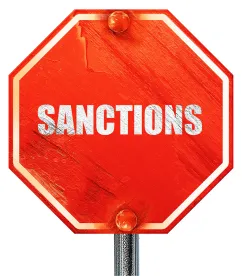Today, April 6, 2018, the U.S. Treasury Department’s Office of Foreign Assets Control (OFAC) announced that it is adding a number of Russian individuals and entities to its list of Specially Designated Nationals. The newly sanctioned individuals include several who were identified in a report of Russian senior political figures and “oligarchs” that was issued by the U.S. Treasury Department in January, as required by the Countering America’s Adversaries Through Sanctions Act (CAATSA), which was passed by Congress in 2017.
This latest OFAC action prohibits U.S. companies and individuals from engaging in transactions with the listed individuals and entities, or any person (including a legal entity) that is owned (50 percent or more) or controlled by the sanctioned persons, or an individual or entity acting on behalf of the sanctioned persons. All property and interests in property of the sanctioned persons and their owned/controlled companies that fall within the scope of U.S. jurisdiction will now be blocked.
Penalties for violations of these sanctions include civil penalties of up to $295,141, or twice the amount of the value of the underlying transaction (whichever is higher), per transaction. Criminal penalties of up to $1 million and 20 years’ imprisonment can also be imposed for willful violations.
In addition, persons and entities that engage in or facilitate “significant” transactions with such sanctioned individuals and entities or their owned/controlled companies can be subject to secondary sanctions under the provisions of CAATSA. Additional guidance on the scope of the new sanctions is available through new frequently asked questions issued by OFAC. Further guidance on the specific meaning of “significant” and “facilitate” in this context is available here. OFAC has also issued two general licenses (available here and here) that permit the wind-down of certain existing transactions with some, but not all, of the sanctioned persons.
Companies should carefully examine the new lists of sanctioned individuals and entities and take steps to protect their interests. In addition, companies should continue to closely monitor the U.S. sanctions on Russia for future OFAC sanctions.




 />i
/>i

